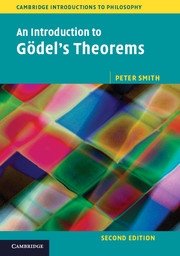Book contents
- Frontmatter
- Contents
- Preface
- Thanks
- 1 What Gödel's Theorems say
- 2 Functions and enumerations
- 3 Effective computability
- 4 Effectively axiomatized theories
- 5 Capturing numerical properties
- 6 The truths of arithmetic
- 7 Sufficiently strong arithmetics
- 8 Interlude: Taking stock
- 9 Induction
- 10 Two formalized arithmetics
- 11 What Q can prove
- 12 IΔ0, an arithmetic with induction
- 13 First-order Peano Arithmetic
- 14 Primitive recursive functions
- 15 LA can express every p.r. function
- 16 Capturing functions
- 17 Q is p.r. adequate
- 18 Interlude: A very little about Principia
- 19 The arithmetization of syntax
- 20 Arithmetization in more detail
- 21 PA is incomplete
- 22 Gödel's First Theorem
- 23 Interlude: About the First Theorem
- 24 The Diagonalization Lemma
- 25 Rosser's proof
- 26 Broadening the scope
- 27 Tarski's Theorem
- 28 Speed-up
- 29 Second-order arithmetics
- 30 Interlude: Incompleteness and Isaacson's Thesis
- 31 Gödel's Second Theorem for PA
- 32 On the ‘unprovability of consistency’
- 33 Generalizing the Second Theorem
- 34 Löb's Theorem and other matters
- 35 Deriving the derivability conditions
- 36 ‘The best and most general version’
- 37 Interlude: The Second Theorem, Hilbert, minds and machines
- 38 μ-Recursive functions
- 39 Q is recursively adequate
- 40 Undecidability and incompleteness
- 41 Turing machines
- 42 Turing machines and recursiveness
- 43 Halting and incompleteness
- 44 The Church–Turing Thesis
- 45 Proving the Thesis?
- 46 Looking back
- Further reading
- Bibliography
- Index
44 - The Church–Turing Thesis
- Frontmatter
- Contents
- Preface
- Thanks
- 1 What Gödel's Theorems say
- 2 Functions and enumerations
- 3 Effective computability
- 4 Effectively axiomatized theories
- 5 Capturing numerical properties
- 6 The truths of arithmetic
- 7 Sufficiently strong arithmetics
- 8 Interlude: Taking stock
- 9 Induction
- 10 Two formalized arithmetics
- 11 What Q can prove
- 12 IΔ0, an arithmetic with induction
- 13 First-order Peano Arithmetic
- 14 Primitive recursive functions
- 15 LA can express every p.r. function
- 16 Capturing functions
- 17 Q is p.r. adequate
- 18 Interlude: A very little about Principia
- 19 The arithmetization of syntax
- 20 Arithmetization in more detail
- 21 PA is incomplete
- 22 Gödel's First Theorem
- 23 Interlude: About the First Theorem
- 24 The Diagonalization Lemma
- 25 Rosser's proof
- 26 Broadening the scope
- 27 Tarski's Theorem
- 28 Speed-up
- 29 Second-order arithmetics
- 30 Interlude: Incompleteness and Isaacson's Thesis
- 31 Gödel's Second Theorem for PA
- 32 On the ‘unprovability of consistency’
- 33 Generalizing the Second Theorem
- 34 Löb's Theorem and other matters
- 35 Deriving the derivability conditions
- 36 ‘The best and most general version’
- 37 Interlude: The Second Theorem, Hilbert, minds and machines
- 38 μ-Recursive functions
- 39 Q is recursively adequate
- 40 Undecidability and incompleteness
- 41 Turing machines
- 42 Turing machines and recursiveness
- 43 Halting and incompleteness
- 44 The Church–Turing Thesis
- 45 Proving the Thesis?
- 46 Looking back
- Further reading
- Bibliography
- Index
Summary
We now bring together Church's Thesis and Turing's Thesis into the Church- Turing Thesis, explain what the Thesis claims when properly interpreted, and say something about its history and about its status.
Putting things together
Right back in Chapter 3 we stated Turing's Thesis: a numerical (total) function is effectively computable by some algorithmic routine if and only if it is computable by a Turing machine. Of course, we initially gave almost no explanation of the Thesis. It was only very much later, in Chapter 41, that we eventually developed the idea of a Turing machine and saw the roots of Turing's Thesis in his general analysis of the fundamental constituents of any computation.
Meanwhile, in Chapter 38, we introduced the idea of a μ-recursive function and noted the initial plausibility of Church's Thesis: a numerical (total) function is effectively computable by an algorithmic routine if and only if it is μ-recursive. Then finally, in Chapter 42, we outlined the proof that a total function is Turing-computable if and only if it is μ-recursive. Our two Theses are therefore equivalent. And given that equivalence, we can now talk of
The Church–Turing Thesis The effectively computable total numerical functions are the μ-recursive/Turing-computable functions.
Crucially, this Thesis links what would otherwise be merely technical results about μ-recursiveness/Turing-computability with intuitive claims about effective computability; and similarly it links claims about recursive decidability with intuitive claims about effective decidability.
Information
- Type
- Chapter
- Information
- An Introduction to Gödel's Theorems , pp. 338 - 347Publisher: Cambridge University PressPrint publication year: 2013
Accessibility standard: Unknown
Why this information is here
This section outlines the accessibility features of this content - including support for screen readers, full keyboard navigation and high-contrast display options. This may not be relevant for you.Accessibility Information
- 1
- Cited by
